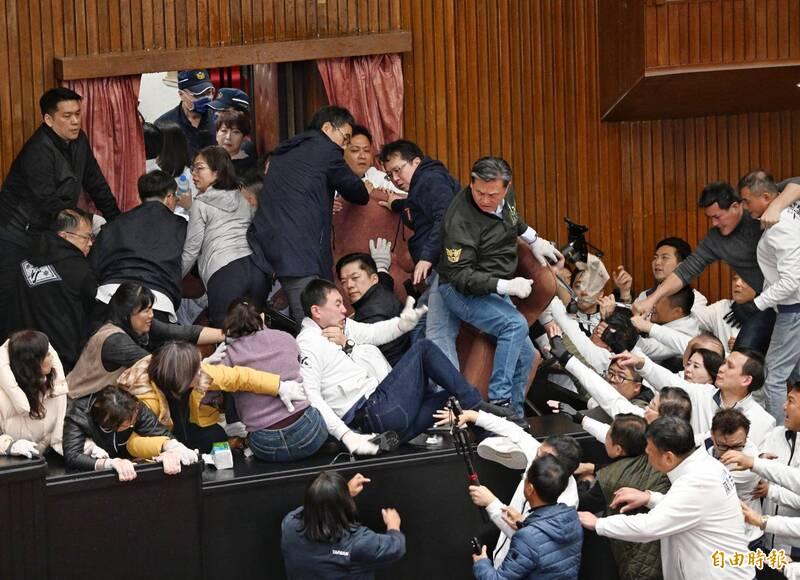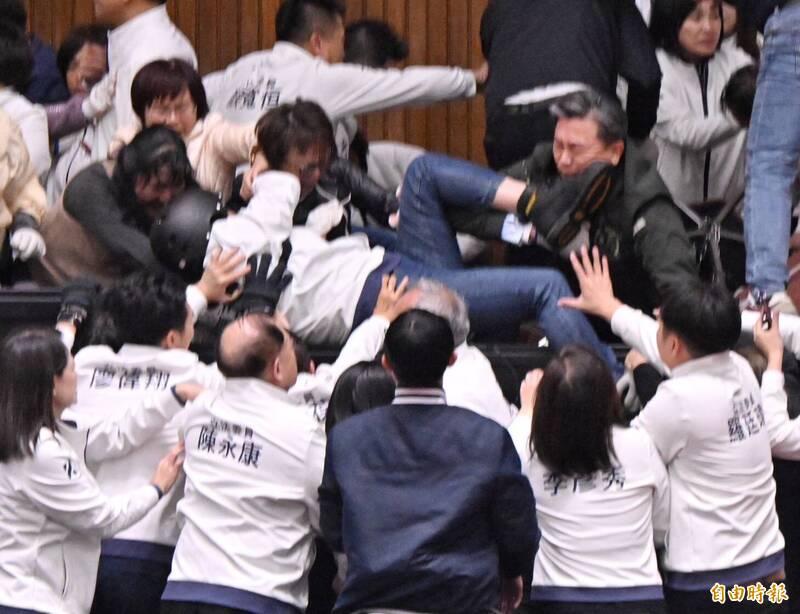Clashes broke out in the legislature this morning between Democratic Progressive Party (DPP) and Chinese Nationalist Party (KMT) legislators after DPP legislators occupied the legislative chamber and speaker’s podium to block the passage of proposed amendments.
The clashes were sparked after DPP legislators late last night entered the chamber by breaking windows and barricaded the doors to prevent KMT legislators from entering.
This morning, KMT legislators broke through the blockade to enter the chamber, leading to multiple clashes between the parties.

Photo: Fang Pin-chao, Taipei Times
The Legislative Yuan was meant to begin their meeting at 10am, but as the DPP and KMT clashed at the speaker’s podium, the meeting had still not begun at 10:30am.
On Tuesday, the Legislative Yuan’s Procedure Committee approved the KMT’s proposed schedule for the meeting today.
The proposed agenda prioritizes discusses amendments to the Public Officials Election and Recall Act today (公職人員選舉罷免法) related to stricter recall thresholds, amendments to the Constitutional Court Procedure Act (憲法訴訟法) about raising the threshold for constitutional court rulings, and amendments to the Act Governing the Allocation of Government Revenues and Expenditures (財政收支劃分法) concerning the allocation of national tax revenue.

Photo: Liu Hsin-te, Taipei Times
In the morning, DPP legislators had used chairs to block all entrances and exits to the chamber, and KMT legislators accused them of gluing the doors and securing them with heavy motorcycle locks, making entry impossible.
Around 8:30am, KMT legislators began to try to force open doors around the podium.
Verbal and physical clashes erupted after the KMT legislators broke through a door and entered the chamber at 9:13am.

Photo: Liu Hsin-te, Taipei Times
KMT Legislator Yeh Yuan-chih (葉元之) laid on the podium and legislators from both sides splashed water on each other.
Verbal clashes also erupted between legislators’ assistants outside the chamber.
KMT Legislator Lai Shyh-bao (賴士葆) was injured during the clashes and was helped by DPP Legislator Wang Cheng-hsu (王正旭), who has a medical background.
Another clash broke out at 9:44am, when KMT Legislator Jessica Chen (陳玉珍), wearing a safety helmet, attempted to pull DPP Legislator Chen Pei-yu (陳培瑜) and others from the speaker’s podium.
A physical clash again broke out when KMT Legislator Chang Chih-lun (張智倫) tried to climb onto the podium and was confronted by DPP Legislator Kuo Kuo-wen (郭國文), causing legislators from both sides to fall to the floor.
KMT legislators Yang Chiung-ying (楊瓊瓔), Chiu Chen-chun (邱鎮軍) and others later climbed onto the podium to remove DPP legislators Michelle Lin (林楚茵), Huang Jie (黃捷), Lin I-chin (林宜瑾) and others who were holding onto the podium to prevent the meeting from continuing.
Meanwhile, Taiwan People’s Party (TPP) legislators held banners in the chamber that read “hold the meeting,” “no violence” and “democracy is blocked.”
At 11:40am, Legislative Speaker Han Kuo-yu (韓國瑜) made his way from the meeting room to the legislative chamber, but DPP legislators blocked his way at the door.
KMT legislators pulled the DPP legislators away from the door and Han was escorted to the chamber by security guards, but he was still pushed and shoved to the ground.
Han reached the speaker’s podium and called for order in the chamber, announcing that the meeting had begun.
Due to excessive chaos in the chamber, in accordance with Article 35 of the Legislative Yuan’s procedures (立法院議事規則), a hand vote would be conducted, Han said, inciting cheers from KMT legislators.
The KMT would not allow President Lai to go on the violent path, KMT Chairman Eric Chu (朱立倫) said today, accusing the DPP lawmakers of reversing Taiwan’s democratic progress.
The ruling DPP is implementing “martial law” in the Legislative Yuan, TPP caucus whip Huang Kuo-chang (黃國昌) told a press conference this morning.
The ruling party is “attacking” the legislature with violence, overriding law and order and paralyzing the constitutional democracy of the nation, he said.
“DPP Chairman William Lai should come forward and face our fellow Taiwanese,” he continued, “Is that you who gave the order?”
The DPP tried hard to enter the meeting room because the KMT and the TPP were using their “majority dictatorship” to try to pass amendments that could bring irreversible harm to Taiwan’s democracy, DPP caucus chief executive Rosalia Wu (吳思瑤) said, using the microphone in the meeting room at 8am.
That is why the DPP had to take action to safeguard Taiwan, she said.
The coming weeks are crucial to the nation’s survival, DPP caucus whip Ker Chien-ming (柯建銘) wrote on Facebook last night.
There would be no more recall if amendments to the Civil Servants Election and Recall Act were to be approved because it would allow the KMT and the TPP to “cooperate” with China by proposing any unconstitutional bill they want to “mess up” Taiwan, he said.
Any unconstitutional bill could become constitutional as amendments to the Constitutional Court Procedure Act would prevent the Grand Justices from interpreting the constitution, he said.
Amendments to the Act Governing the Allocation of Government Revenues and Expenditures would leave no budget for the central government to implement any social welfare policy, he said.
“Would that be acceptable to the people?” he asked.

SECURITY: As China is ‘reshaping’ Hong Kong’s population, Taiwan must raise the eligibility threshold for applications from Hong Kongers, Chiu Chui-cheng said When Hong Kong and Macau citizens apply for residency in Taiwan, it would be under a new category that includes a “national security observation period,” Mainland Affairs Council (MAC) Minister Chiu Chui-cheng (邱垂正) said yesterday. President William Lai (賴清德) on March 13 announced 17 strategies to counter China’s aggression toward Taiwan, including incorporating national security considerations into the review process for residency applications from Hong Kong and Macau citizens. The situation in Hong Kong is constantly changing, Chiu said to media yesterday on the sidelines of the Taipei Technology Run hosted by the Taipei Neihu Technology Park Development Association. With

A US Marine Corps regiment equipped with Naval Strike Missiles (NSM) is set to participate in the upcoming Balikatan 25 exercise in the Luzon Strait, marking the system’s first-ever deployment in the Philippines. US and Philippine officials have separately confirmed that the Navy Marine Expeditionary Ship Interdiction System (NMESIS) — the mobile launch platform for the Naval Strike Missile — would take part in the joint exercise. The missiles are being deployed to “a strategic first island chain chokepoint” in the waters between Taiwan proper and the Philippines, US-based Naval News reported. “The Luzon Strait and Bashi Channel represent a critical access

‘FORM OF PROTEST’: The German Institute Taipei said it was ‘shocked’ to see Nazi symbolism used in connection with political aims as it condemned the incident Sung Chien-liang (宋建樑), who led efforts to recall Democratic Progressive Party (DPP) Legislator Lee Kun-cheng (李坤城), was released on bail of NT$80,000 yesterday amid an outcry over a Nazi armband he wore to questioning the night before. Sung arrived at the New Taipei City District Prosecutors’ Office for questioning in a recall petition forgery case on Tuesday night wearing a red armband bearing a swastika, carrying a copy of Adolf Hitler’s Mein Kampf and giving a Nazi salute. Sung left the building at 1:15am without the armband and apparently covering the book with a coat. This is a serious international scandal and Chinese

COUNTERINTELLIGENCE TRAINING: The ministry said 87.5 percent of the apprehended Chinese agents were reported by service members they tried to lure into becoming spies Taiwanese organized crime, illegal money lenders, temples and civic groups are complicit in Beijing’s infiltration of the armed forces, the Ministry of National Defense (MND) said in a report yesterday. Retired service members who had been turned to Beijing’s cause mainly relied on those channels to infiltrate the Taiwanese military, according to the report to be submitted to lawmakers ahead of tomorrow’s hearing on Chinese espionage in the military. Chinese intelligence typically used blackmail, Internet-based communications, bribery or debts to loan sharks to leverage active service personnel to do its bidding, it said. China’s main goals are to collect intelligence, and develop a